|
|
|
Sort Order |
|
|
|
Items / Page
|
|
|
|
|
|
|
| Srl | Item |
| 1 |
ID:
183923


|
|
|
|
|
| Summary/Abstract |
This study uses ethnography along Ethiopian women's irregular migration routes through Djibouti to analyse the complex reasons women leave home to seek labour opportunities in the Gulf States. Theories and policies that either narrowly depict women's motivations as economic in nature or focus only on women's needs for security and protection, fail to account both for the politics of seeking employment abroad, and the ways migration provides women a potential refuge from various forms of violence at home. Using a feminist analysis, we argue that women do not migrate only for financial opportunities, but also to escape combinations of domestic, political and structural violence. As such, irregular migration both evinces a failure of asylum systems and humanitarian organisations to protect Ethiopians, and a failure of the state to provide Ethiopian women meaningful citizenship. Lacking both protection and meaningful citizenship, international migration represents women's journeys for opportunity and emancipation.
|
|
|
|
|
|
|
|
|
|
|
|
|
|
|
|
| 2 |
ID:
142060
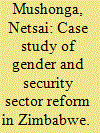

|
|
|
|
|
| Summary/Abstract |
This article explores gender and security sector reform (SSR) in Zimbabwe from 2008 to the present. It firstly postulates that the purpose of gender-sensitive SSR is to transform security services so as to enhance human security, as opposed to having an exclusive focus on state and territorial security. A comprehensive analysis of the policy and legislative framework governing gender and SSR at the global, continental, sub-regional and national levels will be presented, followed by the argument that efforts to reform the partisan and oftentimes non-professional tendencies of the security sector – especially the Zimbabwe Defence Forces, Zimbabwe Republic Police, Central Intelligence Organisation and Zimbabwe Prison Services – to promote democracy have met with firm resistance. However, gender-sensitive SSR has made significant headway in Zimbabwe since it is considered less threatening by the government. It should be noted, nevertheless, that gender-sensitive SSR has the potential to shift levels of professionalism and accountability within the sector as well as change attitudes to enhance security at the personal and communal levels. The process can gradually increase the percentage of women serving in the security sector. In conclusion, recommendations are made to broaden and deepen gender-sensitive SSR as the only viable alternative in the current political environment in Zimbabwe.
|
|
|
|
|
|
|
|
|
|
|
|
|
|
|
|
| 3 |
ID:
168225
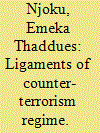

|
|
|
|
|
| Summary/Abstract |
There is a dearth of studies on indirect victims of sexual violence in counter-terrorism efforts. Using Nigeria as a case study, this paper argues that global and state-level counter-terrorism policies have generally failed to account for the psychological effects of the engagement of female NGO workers in counter-terrorism operations or mitigating the effects of terrorism in conflict zones. Specifically, there has been an increase in sexual violence perpetrated by some members of the security agencies involved in counter-terrorism operations in North-eastern Nigeria. As a result, female NGO workers carry out Medicare, psychosocial counselling and advocacy for these victims. Female NGO workers become exposed to the trauma of victims of sexual violence, which affects their mental health and thus performances in counter-terrorism activities in the country. This altered their worldview on issues of safety even among secured locations or among the presence of security agents and reinforced feelings of powerlessness.
|
|
|
|
|
|
|
|
|
|
|
|
|
|
|
|
| 4 |
ID:
142058
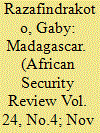

|
|
|
|
|
| Summary/Abstract |
Despite a constitution that condemns discrimination, as well as positive efforts by all stakeholders, Madagascar is still far from meeting the desired objectives of the Southern African Development Community (SADC) Protocol on Gender and Development, or any other relevant international instruments and conventions. The establishment of an Organising Technical Committee on security sector reform for Madagascar is a positive development, which will hopefully facilitate an understanding of the multiple facets of gender and security in Madagascar as well as advancing the implementation of the instruments calling for greater female participation in the security sector.
|
|
|
|
|
|
|
|
|
|
|
|
|
|
|
|
| 5 |
ID:
161586
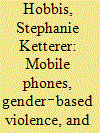

|
|
|
|
|
| Summary/Abstract |
This paper examines the potential benefits and pitfalls of mobile phones for accessing social services, particularly in response to gender‐based violence, in Solomon Islands and Papua New Guinea. Drawing on 13 months of ethnographic field research, I show how mobile phones increase rather than decrease perceived distances between social service providers and those they intend to serve. Mobile phones exaggerate the visibility of the shortcomings of the Solomon Islands and Papua New Guinea states and solidify an already entrenched distrust in the state and state services. This distrust is accentuated in experiences with mobile phone‐based mediations of gender‐based violence. Despite the positive influences of mobile phones, they are also recognised as conduits of violence. As such, mobile phones are not only morally ambivalent technologies but also, at times, actively disliked and their use discouraged. This challenges the optimism that surrounds many information and communication technologies for development (ICT4D) projects. When assessing the potentials, successes, and failures of ICT4D programmes, there is a need to pay more attention to the consequences of ‘negative’ or ‘unreliable’ usages of mobile phones as relational technologies.
|
|
|
|
|
|
|
|
|
|
|
|
|
|
|
|
| 6 |
ID:
152800
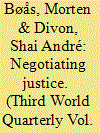

|
|
|
|
|
| Summary/Abstract |
The plural legal system in post-conflict Liberia expresses tensions between modern and customary institutions. This article seeks to understand how Liberians navigate choices in the plural legal system to address gender-based violence cases. By asking how and why people make the choices they do, we highlight how Liberians solve tensions between institutions, by creating flexible categories that allow them to pursue a course of action that does not compromise their ability to access social networks and resources
|
|
|
|
|
|
|
|
|
|
|
|
|
|
|
|
| 7 |
ID:
170542
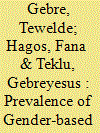

|
|
|
|
|
| Summary/Abstract |
In Ethiopia, large numbers of women are at higher risk of gender-based violence and harmful traditional practices. The main aim of the study is to explore the prevalence rate of gender-based violence and harmful traditional practices against women in the Tigray region, Ethiopia. In this study, a total of 1253 women were surveyed, of which 560 were from rural areas. Further, 14 focus group discussions and in-depth key informant interviews were conducted with relevant governmental and non-governmental bodies. It was found that a significant number of married women were not asked for their permission to be married and their mate was mostly selected by their family. Among others, age was found to be a statistically significant predictor for early marriage and permission of girls to get married with an odds ratio of 0.95 and 0.97, respectively (p < 0.05). Twenty-one forms of gender-based violence and 29 forms of harmful traditional practices and stereotypes against women were identified. These practices were mostly supported by the community. While gender-based violence was found to be somewhat higher in urban areas, most of the harmful traditional practices were slightly higher in rural areas.
|
|
|
|
|
|
|
|
|
|
|
|
|
|
|
|
| 8 |
ID:
163739
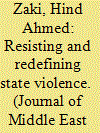

|
|
|
|
|
| Summary/Abstract |
For decades, thousands of Tunisian women suffered from systematic sexual violence at the hands of state agents, with many now seeking justice and public recognition of those crimes following the 2011 Jasmine revolution. While Tunisia’s process of transitional justice created an opportunity to construct new narratives of women's rights, it paradoxically created more barriers to holding the state accountable for its violations, mainly because of the centrality of the state hegemonic narratives of women’s rights in the legal and political process of transitional justice. In this article, I investigate the limitations and gendered paradoxes inherent in the process of transitional justice in post-revolutionary Tunisia. Focusing on the Truth and Dignity Commission established in 2014, I explore how gender-based violence featured into the formal procedural mechanisms of transitional justice, and the degree to which women’s voices were incorporated into the making of the rules and procedures related to providing compensations and rehabilitation to victims of gender-based violence. Furthermore, I analyze how official narratives of gender-based violence committed by the state enforced traditional gendered categories, perpetuating the state's prerogative powers over its citizens and reflecting the requirements of Tunisia's fragile political settlement. Through such an approach, I hope to develop a deeper understanding of the role that nationalist narratives on women’s rights play in the context of transitional justice and suggest viable recommendations for building accountable state institutions that could effectively address gender inequality as an essential goal of democratic governance.
|
|
|
|
|
|
|
|
|
|
|
|
|
|
|
|
|
|
|
|
|